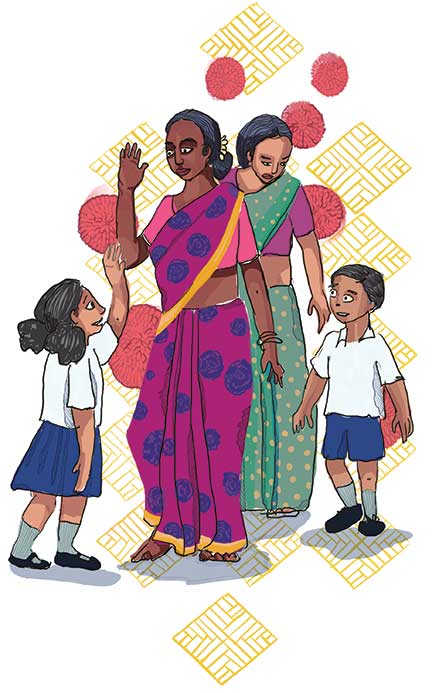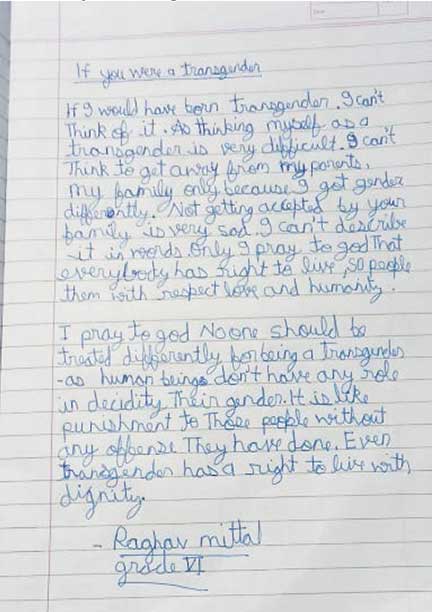Soma Chakraborty
The teachers of Delhi World Public School, Bangalore, had attended a comprehensive workshop on critical thinking through stories and storybooks. In this webinar, there was a session on gender stereotypes. Rituparna, a transgender non-binary guest, was invited to talk to the educators. The session helped teachers understand “EXCLUSION” and that storybooks are an excellent medium to discuss sensitive issues with children.

The session led to dialogue around different forms of exclusion that exist in our society and how teachers can play a part in making it more inclusive. Teachers read the book Gutli has wings by Kanak Shashi, in which a young boy wanted to wear his sister’s pink dress instead of the pant and t-shirt bought for him. The objective of the conversation was to create awareness among teachers about gender and to change our (teachers) mindset and accept all people as equals in our social fabric.
Gender discrimination is a topic that appears in social science albeit in a different context in history and political science. So far, the topic was mostly taught through examples and discussions. But this year, the teachers, having attended the workshop, were keen to explore different ways of teaching this topic in the classroom. My school encourages its teachers to bring back learnings from workshops and apply them in our teaching-learning practice. The English teacher read aloud a story Friends Under the Summer Sun to grades V to IX. The book, written by Ashutosh Pathak, is the story of a young curious girl, who inadvertently learns to accept humans as they are and not be biased about their gender orientation. This read-aloud was followed by many discussions and classroom activities. Encouraged by the response, the teachers decided to bring in a guest to understand the ‘non-binary community’ better. This resulted in the school organizing an online interaction for the students of grades VI to XI with a transgender guest, Zoya Lobo, who transformed from seeking alms in Mumbai trains to becoming a photojournalist.
The teachers sensitized the children before the meeting about the questions they could ask. They were asked to follow certain etiquette so as not to hurt the sentiments of the invited guest. There was excitement in the air. The students were animated about the interview and to meet the guest.
There was a moment of eerie silence as soon as Zoya came in front of the camera, followed by a few initial moments of awkwardness. The teachers sensing the silence began by asking the initial questions to break the ice and after a while, the children joined the conversation. Some of the questions raised by the children were
• What kind of hardships do transgender people face?
• How did you know that you wanted to change your gender?
• At what age did you realize it?
• How did your family react when they got to know that you were a transgender? Did they support you?
• What kind of support do you require from the government?
For many of us who associate transgender people with begging at traffic lights, this interaction was an eye-opener. We came to know of the problems they face in a society that ignores their existence. Zoya answered each question in a simple way that helped the children process the information. Zoya spoke about the problems and challenges that the transgender community face. The most difficult ordeal was not being accepted by their immediate families, being teased in schools, being forced to discontinue education, lack of medical facilities, unemployment, not getting a house on rent, no access to toilets in public spaces, etc.
The following morning, the students were eagerly waiting for the social science class; the young minds were already at work. Though we were studying a chapter in geography at the time, the whole class wanted to discuss the previous day’s guest and they had more questions to ask and discuss. The children discussed how the problems of gender discrimination could be addressed and how we could bring about a change in the society. They suggested various ways they could contribute to bring about a small change in the system. Some of them offered to conduct evening classes during the holidays, some offered to help them financially.
At the end of the class, grade VI were asked to write on the topic “If I were a transgender”. That evening I received a phone call from a parent who was upset to see the topic for writing and questioned the logic behind giving such a topic to the children. I took the time to explain that the objective was to sensitize children about the third gender and see life from a disadvantaged perspective.
The children submitted their homework after two days. I read the essays, tears rolled down my eyes. I was elated. The little minds could see the larger picture. They are the torchbearers of our society and it is my job as a teacher to instil a sense of responsibility in them to bring a change in the society.
The following is a write-up from a student.

During COVID, I was working from Kolkata and I met my nephew during the Durga puja. While talking about my work, I shared with him the interactions that I had with Rituparna and Zoya. We wondered how we could make a difference in the lives of the transgender community. My nephew and his family own a fuel station in Barrackpore and he was open to the idea of hiring them as staff to work at the station.
I was both tense and eager about the next step. The next weekend we went to a kinnar basti to meet their ‘Head.’ They lived along the railway tracks in small shanties, since no one was ready to have them in their neighborhood. On reaching the basti; two people came out, peeked at us and enquired who we were waiting for. We informed them about our intention and were asked to sit along the railway track and wait for the “Head”. The land along the railway track served as an extension of their homes and was an ideal place for entertaining guests. As we waited, I observed their homes, their lifestyles, their dresses, their communication with their peers and neighbours.
A middle-aged man with long curly hair came out buttoning his shirt after some time and spoke at length. He said they lost five members during the first wave of COVID and since people were all indoors it was hard to get any alms. Running their day-to-day expenses was getting harder now. He sighed saying death was inevitable either by corona or by poverty. He cursed the lord using abominable gaalis. I was caught off guard and embarrassed by his curses, but right at that juncture my nephew put across his idea of hiring one of them. The Head couldn’t believe his ears and asked us again if we were serious about hiring.
The Head was initially sceptical about the idea and doubted our intentions. But after hearing us, he was assured that we had no wrong intentions. He felt that Ujjwala would be an ideal candidate and introduced us. Ujjwala had studied till class III and could read numbers. We gave the address of the petrol station and asked Ujjwala to come and meet my nephew the next Monday.
Monday morning Ujjwala arrived on time dressed well in a feminine attire. Ujjwala was briefed about the work hours, salary, and was asked to come dressed in the uniform that all workers at the petrol station wore – a blue shirt and khaki trousers. Ujjawala was then introduced to the other workers and one of them was assigned to handhold and train Ujjwala.
Ujjwala soon became the point of conversation at the petrol station. There was a simmer of displeasure about hiring Ujjwala. Why Ujjwala? Why not Shambhu’s brother or why not Pritam’s friend? What if Ujjwala started soliciting? What if Ujjwala stole money and ran away? A lot of eyebrows were raised.
Sensing the discomfort, all employees were called into a room and spoken to; it was high time that we accepted many more Ujjwalas into our system. They were also reassured that nothing untoward would happen if they trusted and accepted Ujjwala like any other colleague. They were told that more people would be hired after lockdown. There was a sigh of relief that Shambhu’s brother and Pritam’s friend would also be hired soon.
As we stood up for a cup of tea from the nearby tea shop, Ujjwala came running and clasped my nephew’s hands and said, “Saab aaj se mujhe bheek nahi mangna hoga.” Ujjwala’s eyes were moist and so were ours. Not knowing how to react, I blessed Ujjwala and went back home feeling very satiated.
We all have a moral responsibility to give back to the society and to mother Earth in our own way and this was a small gesture to help someone live with dignity.
The author teaches social science at Delhi World Public school, Bangalore. She is a learner and avid nature lover who believes that there can be no better teacher than nature herself. She enjoys travelling and being in the company of children. She can be reached at soma.chakraborty09@gmail.com.
